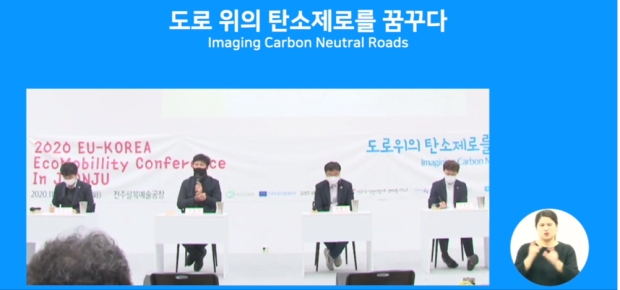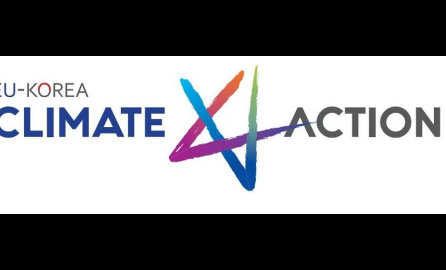Event 2: 2020 EU-Korea Eco-Mobility
The EU-Korea Climate Action Project in cooperation with the Eco Mobility Network of the Local Sustainability Alliance Korea (LSAK) and ICLEI Korea organized 2020 EU-Korea EcoMobility Conference on 16 and 17 November 2020 to provide an opportunity to share and learn about low carbon and sustainable mobility policies and programs at local levels. The program consisted of three sessions - session 1: Civil Society; session 2: Local government; session 3: EcoMobility and City (M-LEAD)
Session 1: Civil Society
The invited speakers were Yong-seok Oh, General Secretary of Daegu Office of LSAK, and Antonios Proestakis, Social Biking Challenge Coordinator, Joint Research Centre of European Commission.
The first speaker, Yong-seok Oh, informed on the outcomes of Korea’s ‘2020 Bike to Work Challenge’ program operated by the Local Sustainability Alliance of Korea and other organizations. They developed the Eco-Bike smart phone application and the website, performed online and street campaigns, and displayed advertising. As a result, compared to 2019’s performance, the number of program participants increased by 700, the participant’s biking distance increased by more than three times, and the greenhouse gas emissions reduction volumes increased by four times. The program operators are planning to build big data for each participant city and cooperate with the European Social Biking Challenge in the near future.
Antonios Proestakis presented the EU’s Social Biking Challenge. The program is designed based on the concept of social incentives created from collective cooperation and interactions. As more people bike together, the higher the probability for the participants to be rewarded together. The Program offers a three stage challenges: individual stage, pair stage and group stage. In each stage, the best performers are receiving a local award, which is organized and awarded by the local coordinators of the challenge, such as DG MOVE and DG EAC.

Session 2: Local Government
The Session 2, moderated by Bonghee Son, the Key Expert of the EU-Korea Climate Action Project Team, began with a “15-minute City” video by Carlos Moreno, professor and advisor of the Mayor of Paris, who presented the vision of Paris where the citizens will have access to all their needed services within their immediate vicinity in 15 minutes. After the video, the Mayor of Jeonju city, Seung-su Kim, presented the City’s vision towards Eco-City. The City's methods to achieve the vision include developing eco-playgrounds for children, preserving biodiversity and animal welfare, promoting healthy food, local energy, and eco mobility. As part of eco mobility, Jeonju city is redeveloping its bus routes, introducing hydrogen buses, and establishing bicycle networks.
The next presentation was delivered by Deputy Mayor of Malmö, Andréas Schönström. He stated that Malmö’s transportation policy priority focus on the pedestrians first, followed by biking, public transportation, trucks and privately owned cars. Currently, 15% of the transportation demands in Malmö are met with walking, 22% with bicycles, 21% with public transportation and 40% with cars. He added that this will increase to 30% with bicycles, 25% with public transportation, while the share by privately owned cars will be reduced to 30%. In order to encourage more people to bike and walk for mobility, Malmö established a bicycle and pedestrian priority policy, which includes enforcing 500 km of bicycle lanes, opening of a bicycle service center, introduction of bicycle rentals, increased parking fees in downtown, and reduction in vehicle roads.
After the presentation, a discussion and Q&A session started. One question was asked to the Deputy Mayor of Malmö about whether the government's supports in pedestrian’s rights and implementing bicycle policies are selective or universal in Sweden. He answered that although cities usually finance their own policy implementations, residents near the area where development happens have to bear 50% of the financial burden because the development will increase the value of their properties. In responding to the question on whether Jeonju has a plan to build a city similar to European Eco-city, Seung-su Kim said that building Eco-city is a big project which will change the entire urban structure, and Jeonju is not ready for that change yet. He emphasized that nevertheless Jeonju has been putting a lot of efforts to build more pathways for pedestrians and bicycles and established dedicated department only for bicycles. He added that he has a clear understanding that there is a need to build an Ecomobility city eventually in the future.

Session 3: EcoMobility and City (M-LEAD)
The session 3 was led by Yonghee Park, the head of ICLEI Korea who introduced four cities in Korea, Jeonju city, Suwon city, Hawseong and Seoul Gangdong district, which participated to declare a M-LEAD for the innovative urban mobility system. M-Lead stands for Leading Cities Action for Sustainable Development.
Seongbok Eom, Head of Public Bus Policy Bureau of Jeonju city, presented on the restructuring of public bus routes in Jeonju City. Restructuring the bus routes improved the air quality, traffic safety and efficiency while reducing greenhouse gas emissions. In restructuring the bus routes, Jeonju city organized two roundtable discussions to decide the principles of bus routes restructuring, to vote on the best routes, and gather the citizens’ opinions to make the final decision.
The second presentation was delivered by Woojae Jeong, Manager of Free Public Transportation Team, Hwaseong City. To solve the problem of public transportation in Hawseong city, the city introduced green transportation policies such as free transportation, public bus system, and transition to electric and hydrogen buses. As of now, Hawseong city is providing free transportation to its citizens under 23 years and above 65 years of age.
The public transportation policies of Brussels were introduced by Martin Lefrancq, Smart Transport Coordinator of the City of Brussels. He introduced the 'Good Move' project which is a process to achieve sustainable and innovative mobility solutions in the Brussels-Capital region. Good Move established the city’s visions towards an eco-friendly, social, healthy, effective, safe and efficient city reflecting results from joint discussions with private, public and civic groups. Regarding mobility, Good Move targets the following: manage the global demands for trips, reduce the usage of privately owned cars, strengthen mobility service solutions, structured and efficient transport and transit network, and establish parking policy in line with mobility vision. To this end, five intertwined efficient networks were defined: walking, biking, public transportation, automobile transportation, and mass logistics transportation. To achieve the vision of increasing collective and shared trips to 76%, Good Move proposed 50 actions such as supporting the development of mobility as a service and setting up information points and integrated services hubs.

Related documents
2020 Bike to Work Challenge - OH YongSeok
English (6.46 MB - PDF)Implementation and Achievemnet of the EU's Social Biking Challenge - Antonios Proestakis
English (1.6 MB - PDF)Human City Built on Eco-Mobility - Seung-su Kim
English (5.63 MB - PDF)Eco-Mobility Policies of Hawseong City - Cheol-mo Seo
English (10.38 MB - PDF)Eco-Mobility Cases of Malmo - Andreas Schonstrom
English (12.06 MB - PDF)Public Transportation Policies of Brussels - Martin Lefranq
English (2.96 MB - PDF)EcoMobility Conference Program
English (529.75 KB - PDF)